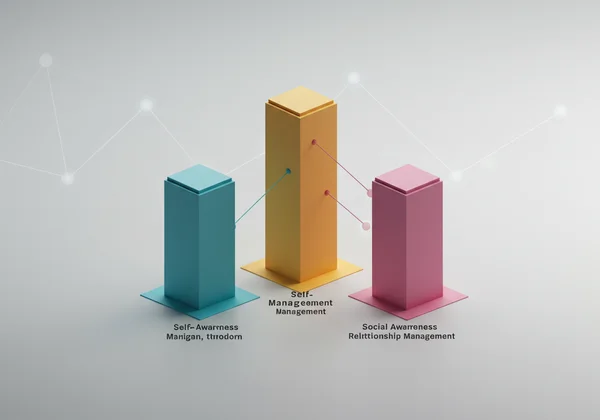EI Test Foundations: Goleman's 4 Pillars of Emotional Intelligence
September 7, 2025 | By Evelyn Reed
Welcome to the fascinating world of emotional intelligence! If you've ever wondered what separates good leaders from great ones, or why some people seem to navigate social situations effortlessly, the answer often lies in their EI. Understanding your emotional landscape is the first step towards personal and professional growth. A comprehensive EI test is built upon a solid scientific framework, and one of the most influential is Daniel Goleman's model. So, what are the 4 pillars of emotional intelligence that form the bedrock of this crucial skill?
Let's explore each of Goleman's four pillars, giving you a clear roadmap to understanding your emotional makeup. By exploring these foundations, you'll be better equipped to interpret your emotional intelligence score and embark on a meaningful journey of self-improvement. Ready to discover the components of your inner world? You can start by taking our free EI test online to get a baseline.

Self-Awareness: The Cornerstone of Emotional Intelligence
Self-awareness is the absolute foundation of emotional intelligence. Without it, the other pillars cannot stand firm. It is the ability to see yourself clearly and objectively—to understand your emotions, your triggers, and how they impact your thoughts and behavior. This isn't just about knowing you're happy or sad; it's about understanding the nuances of your feelings and their origins.
Developing this skill allows you to recognize your own patterns. You begin to see why you react strongly to certain situations or people. This clarity is empowering, as it moves you from a place of reaction to one of conscious choice. A high degree of self-awareness is often a key indicator in an online emotional intelligence test, reflecting a person's capacity for introspection and honesty.

Recognizing Your Emotional Landscape
Think of your emotions as an internal weather system. Recognizing your emotional landscape means being able to identify if it's sunny, stormy, or just a bit cloudy inside. It’s the practice of checking in with yourself throughout the day and naming what you feel: "I'm feeling anxious about this meeting," or "I'm feeling a sense of pride in this work."
This practice of labeling emotions helps to demystify them, reducing their power to overwhelm you. It's the difference between being engulfed by a wave of anger and observing, "Ah, there is anger." This simple act of recognition is the first step toward managing that emotion effectively and is a core component of any valid EI assessment.
Understanding Your Strengths, Weaknesses, and Values
Beyond just recognizing emotions, self-awareness involves a deeper self-knowledge. It means having a realistic grasp of what you excel at and where you struggle. Are you a natural empath but find it difficult to set boundaries? Are you highly motivated but sometimes lack patience? This honest self-appraisal is crucial for growth.
Furthermore, it involves identifying your core values—the principles that guide your life. When your actions align with your values, you experience a sense of integrity and fulfillment. When they don't, it often leads to discomfort and internal conflict. Knowing your strengths, weaknesses, and values provides you with a personal compass to navigate life's decisions.
Self-Management: Mastering Your Emotional Responses
Once you are aware of your emotions, the next step is managing them. Self-management, or self-regulation, is about using that awareness to stay flexible and direct your behavior positively. It’s not about suppressing your feelings, but rather about responding to them in a measured and intentional way. How to control emotions is a question many people ask, and self-management is the answer.
At its core, self-management means embracing emotional control, adaptability, and initiative. It's the ability to pause between a feeling and an action, giving you the power to choose your response. Someone with strong self-management skills can handle stress, adapt to change, and remain optimistic even when faced with setbacks. This is why an EI test for leaders often places significant emphasis on this domain.

Controlling Impulses and Emotional Regulation
This is the practical side of self-management. Controlling impulses and emotional regulation means you don't let disruptive feelings derail you. When you receive critical feedback, for instance, you can process the initial sting without lashing out defensively. You can manage feelings of anxiety before a big presentation and channel that energy into focus.
Techniques like deep breathing, mindfulness, and reframing negative thoughts are all tools for emotional regulation. The goal is to maintain emotional balance, allowing your rational mind to stay in the driver's seat. This skill is vital for building trust and reliability in both personal and professional relationships.
Adapting to Change and Embracing Innovation
The world is constantly changing, and our ability to adapt is critical to success. Self-management includes being comfortable with ambiguity and open to new ideas. Instead of resisting change, emotionally intelligent individuals can adjust their strategies and embrace innovation.
This adaptability comes from a place of emotional security. Because they can manage their own feelings of uncertainty, they are better equipped to navigate shifting priorities and overcome obstacles. They see change not as a threat, but as an opportunity for growth and learning, a key trait for anyone looking to improve their emotional intelligence score.
Social Awareness: Empathy and Understanding Others
Moving from the internal to the external, social awareness is the ability to accurately read other people's emotions and understand their perspectives. It is the foundation of empathy and is essential for effective communication and interaction. This pillar involves paying attention to both verbal and non-verbal cues to grasp what is really going on in a social situation.
People strong in social awareness are excellent listeners. They can sense the emotional climate of a room and understand the power dynamics at play. They make others feel seen and heard, which is a powerful tool for building rapport and influence. This is about more than just being "nice"; it's about being attuned to the social world around you.

Developing Empathy and Perspective-Taking
At the heart of social awareness is empathy. Developing empathy and perspective-taking means being able to put yourself in someone else's shoes and understand their feelings and motivations. It's about recognizing that others' experiences and emotional reactions are as valid as your own, even if they are different.
Empathy builds connection and trust. When you show someone you understand their perspective, you create a safe space for open and honest communication. This skill is indispensable for effective teamwork, leadership, and customer relations. You can start to measure your empathic tendencies with a well-designed EQ test.
Reading Social Cues and Organizational Awareness
Beyond individual empathy, social awareness extends to groups. Reading social cues and organizational awareness involves interpreting the unwritten rules and currents of a social environment. It's about understanding the culture of a workplace, the hierarchy within a team, and the key influencers in a network.
This awareness helps you navigate office politics, build strategic relationships, and communicate your ideas more effectively. You know when to speak up, when to listen, and how to tailor your message to different audiences. It's a subtle but powerful skill for anyone looking to make an impact.
Relationship Management: Building Stronger Connections
Finally, relationship management weaves these three pillars into successful interactions. It is about using your awareness of your own emotions and those of others to manage interactions successfully. This skill is what allows you to inspire, influence, communicate clearly, and resolve conflicts. It is the most visible of the four pillars.
Strong relationship management is the key to building and maintaining a healthy, supportive network. It enables you to develop others, work collaboratively toward a shared goal, and lead change effectively. It's where emotional intelligence becomes a tangible asset that can transform your career and personal life. Ready to see how you score? Discover your results today.

Inspiring Influence and Effective Communication
People with strong relationship management skills are persuasive and influential, not through manipulation, but through authenticity. Inspiring influence and effective communication come from their ability to build rapport and articulate a compelling vision. They are skilled at getting buy-in from others and motivating them to act.
Their communication is clear, concise, and tailored to their audience. They are adept at giving constructive feedback and are open to receiving it. This two-way communication fosters a climate of collaboration and mutual respect.
Conflict Resolution and Teamwork Skills
Disagreements are inevitable, but conflict doesn't have to be destructive. Conflict resolution and teamwork skills are hallmarks of high EI. Individuals skilled in this area can de-escalate tense situations, encourage debate and open discussion, and find common ground.
They are natural collaborators who value the contributions of others and work to create group synergy. They understand that a team's collective intelligence is often greater than the sum of its parts. By fostering a positive and cooperative environment, they help teams achieve outstanding results.
Your Journey to Higher EI Starts with Understanding the Pillars
Understanding Daniel Goleman's 4 pillars of emotional intelligence—Self-Awareness, Self-Management, Social Awareness, and Relationship Management—provides a powerful framework for personal development. These pillars are not isolated traits but interconnected skills that build upon one another. Your journey begins with looking inward and grows as you apply that insight to your interactions with the world.
Theory is foundational, but self-assessment brings it to life. An EI test can provide you with a personalized snapshot of your strengths and areas for growth across these four domains.
Ready to take that next step? Take our free EI test today and receive an instant score and analysis. Let this be the start of your journey to unlocking your full emotional potential.
Frequently Asked Questions About Emotional Intelligence Pillars
What are the 4 pillars of emotional intelligence as defined by Goleman?
Daniel Goleman's model identifies four key pillars: 1. Self-Awareness (understanding your own emotions), 2. Self-Management (controlling your emotional responses), 3. Social Awareness (perceiving and understanding others' emotions), and 4. Relationship Management (using emotional awareness to manage interactions and build bonds).
How can understanding these pillars help improve my emotional intelligence?
Understanding the pillars gives you a clear and structured map for improvement. You can identify which specific area needs more attention. For example, if you realize you struggle with self-management, you can focus on specific techniques like mindfulness or impulse control to strengthen that pillar and, in turn, your overall EI.
Do these pillars influence my EI test score or EQ assessment?
Absolutely. A credible EI test score or EQ assessment is designed to measure your proficiency across these fundamental pillars. Your results will often break down your performance in each area, showing you where you excel and where you have opportunities for development. Our platform provides a detailed EI assessment based on these core principles.
What are some signs of high emotional intelligence related to these pillars?
Some common signs include the ability to remain calm under pressure (Self-Management), the capacity to listen actively and understand others' unspoken feelings (Social Awareness), the skill to give thoughtful feedback (Relationship Management), and a realistic understanding of one's own strengths and limitations (Self-Awareness).